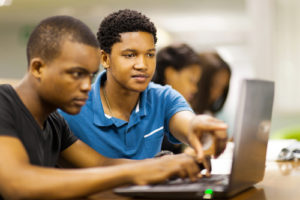8th Grade Insights Into ChatGPT and the Future
By Sarah Cooper

Like so many teachers, I’ve felt both excitement and unease about the potential this AI language model has unleashed: excitement at the many ways this tool could enhance brainstorming, revision and problem solving, and unease at the possibilities for cheating.
Last week I took time during our current events discussions in U.S. History & Civics to talk with eighth graders firsthand about the promise and perils of the bot.
Even a 15-minute conversation energized me and gave me more insight into the tool’s capabilities. What sparked me most? The farsighted perspective students had about how this tool could change not education but our entire lives.
Insight 1: Search feels so much more fluid now, leading to more conceptual thinking and applications.
As the eighth graders returned from winter break, we settled in with a low-key assignment that related to a project in science and also gave students the chance to learn tech skills:
- Find a quotation related to your community impact project that will go on your trifold board for the service fair we’re having at the end of the quarter. This quotation could come from the Internet or from the research you’ve already done for your letter to a politician project.
- Create accounts in Canva, for fun design skills, and in NoodleTools, for robust citation management. We’ll use your NoodleTools account again later this quarter for our reformers research project.
Some students quickly found a quotation or statistics from the letter to a politician they wrote last month, on topics from homelessness to climate change to coyote habitats.

When one student prompted ChatGPT for “good quotes” from “real people” about his topic, however, the list felt curated and smart. Here are three quotations from ChatGPT right now, for instance, in response to: “Please give me 10 strong quotations about the environment spoken by real people.”
- “The environment is where we all meet; where all have a mutual interest; it is the one thing all of us share.” – Lady Bird Johnson
- “In nature, nothing is perfect and everything is perfect. Trees can be contorted, bent in weird ways, and they’re still beautiful.” – Alice Walker
- “The earth is not a gift from our parents. It’s a loan from our children.” – Native American Proverb
This weekend, for an upcoming reformers research project, I also tested out ChatGPT’s capabilities to recommend powerful primary and secondary sources, at an eighth-grade level, about Jovita Idar and Ida B. Wells-Barnett. Even though some links were expired, the results felt sophisticated and – in combination with Google – brought up sources of the quality that it would have taken a typical eighth grader 20-30 minutes to find.
Insight 2: Ethics is front and center for our students.
One of the first questions the eighth graders had is whether there’s any way to tell whether an essay was written by ChatGPT. We talked about the fact that chatbot detectors, such as GPTZero, currently can tell whether a text is AI-generated because of human quirks such as the complexity of text (“perplexity”) or the variety of sentences (“burstiness”).
I have no faith, however, that detectors will be able to keep up with the rapidly evolving AI universe, or that students will not be able to work around the detectors sooner or later, and they tended to agree.

At first, students weren’t sure what the cons of their using the bot were, until a few wandered into the long-term implications with questions such as:
- What if you used ChatGPT to cheat on every take-home assignment and then became my doctor when you grow up?
- What would you lose if you could get away with cheating on every assignment in high school?
Their more high-minded answers included: Curiosity. Learning. Your brain developing.
On her way out of class, one girl also pointed out that, if you did all that cheating in high school, you might feel like you could get away with anything later in your life, like embezzling money.
Insight 3: ChatGPT is asking us to define which skills are truly human.
Even as I’m mentally clicking through my favorite assignments to see which ones need updating in the new paradigm that ChatGPT has wrought (at the top of the list: a 200-word summary of an article for weekly current events presentations), I’ve been thinking beyond the daily work to wondering which skills our students will truly need in the next five or ten years, as AI burgeons in ways we can only start to imagine.
✻ Humor and a sense of play
As eighth graders mucked around with the bot, some asked it to write funny songs about politics or their friends (or both, in the same prompt). They laughed at what ChatGPT created, both because there were amusing elements but also because some of the language felt stilted. How can we keep harnessing this sense of play in our classrooms as AI language models get better and better?
✻ Synthesis
As a history and language arts teacher, for me the most complex level of synthesis has always meant something in writing: an analytical essay, a creative project weaving together facts and texts, a research paper. Even with videos or podcasts, an intricate script has been key.
Now, how much has changed? Beyond tech-free, in-class assessments, what will synthesis look like in a world in which a chatbot can generate a meaningful essay on just about any text?
✻ Persuasion and storytelling
Ultimately, in-person communication using the human voice seems like something we can hold onto as unaffected by AI, at least for now. For the current events summary above, for instance, I’m considering asking students just to write bullet points from the article and use them as a basis for a semi-extemporaneous presentation, followed by a more extensive explanation of why they chose the article than I’ve typically asked for.
An irony hidden in AI?
Wouldn’t it be ironic if ChatGPT’s impact meant we moved away from tech to areas tech can’t touch – to more face-to-face discussions and idea-generating sessions? Such sessions could be summative assessments, Harkness or Socratic seminar style, or formative assessments, leading to a video, podcast or even students’ own AI creation – an interactive product we can only dream of right now.
Here’s to more dreaming, inspired by the students in front of us every day.
Sarah Cooper teaches eighth-grade U.S. history and is Associate Head of School at Flintridge Prep in La Canada, California, where she has also taught English Language Arts. Sarah is the author of Making History Mine (Stenhouse, 2009) and Creating Citizens: Teaching Civics and Current Events in the History Classroom (Routledge, 2017). She presents at conferences and writes for a variety of educational sites. You can find all of Sarah’s writing at sarahjcooper.com.
Feature image and search image by Gerd Altmann from Pixabay

































This is a thoughtful and reasonable approach to teaching. Likewise, Linda Hoseith has done a remarkable job of pointing out the differences between assigning and teaching a research project:
https://www.canva.com/design/DAFZTsqXl5w/RX3jNokeHySCk0Brh85qyA/view?utm_content=DAFZTsqXl5w&utm_campaign=designshare&utm_medium=link&utm_source=publishsharelink#1
I like the focus on ethics. Helping students learn to make ethical decisions can only help them – and us – in a variety of future situations. Smart technology is certainly open to serious misuse, and we need a society of ethical citizens to help control that!